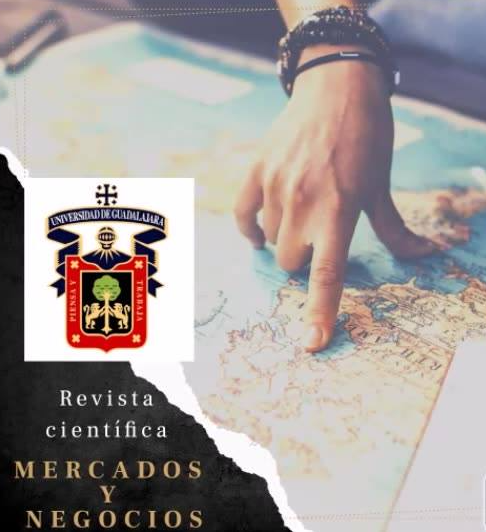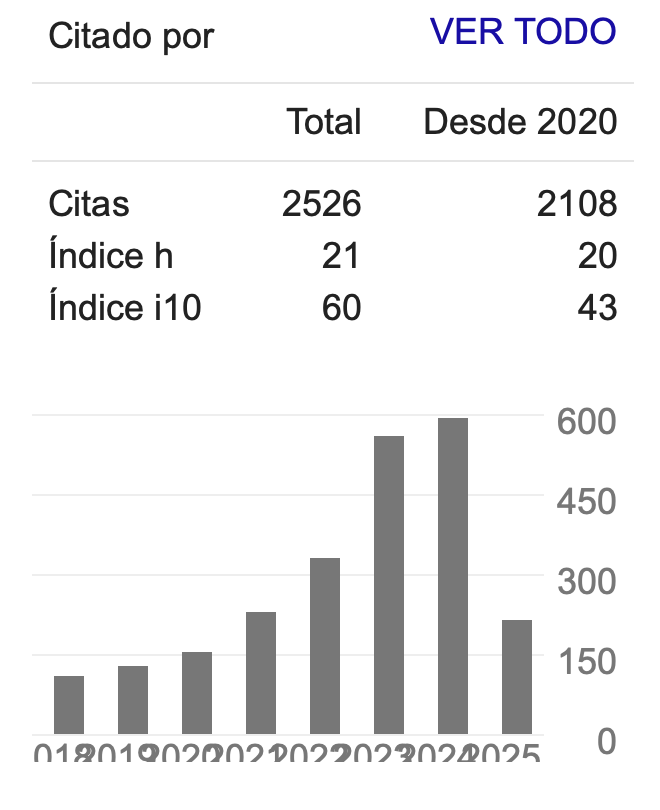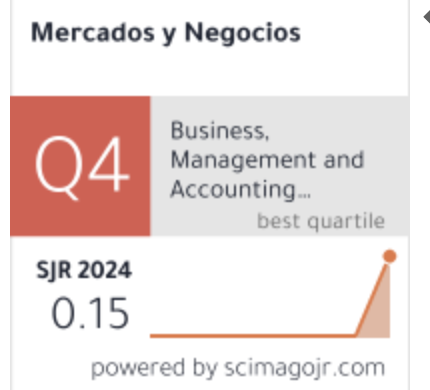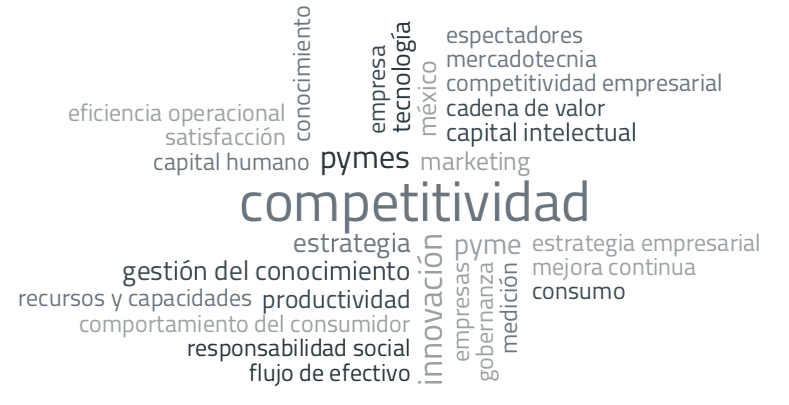Redefining Corporate Social Responsibility and its relation to Sustainable Development Objectives
DOI:
https://doi.org/10.32870/myn.vi47.7682Keywords:
Corporate Social Responsibility, Sustainable Development Objectives, Organizational Performance, CompetitivenessAbstract
The objective of this investigation is to redefine Corporate Social Responsibility (CSR) and its relation to Sustainable Development Objectives (ODS) based on organizational performance and competitiveness. The importance of including in those items new dimensions that currently acquire the item of sustainability in organizations. The main conclusion is that Corporate Social Responsibility constitutes one of the global efforts to translate sustainable development into something concrete and measurable.References
Alvino, F., Di Vaio, A., Hassan, R., & Palladino, R. (2020). Intellectual capital and sustainable development: A systematic literature review. Journal of Intellectual Capital, 22(1), 76-94.
Amato, C. N. (2014). Redefinición del concepto de desempeño y sus dimensiones en el marco de la sustentabilidad organizacional. Conicet Digital, 13(02), 1-8. Link: https://n9.cl/zt1q
Amodu, N. (2020). Corporate Social Responsibility and Economic Globalization: Mainstreaming Sustainable Development Goals into the AfCFTA Discourse. Legal Issues of Economic Integration, 47(1).
Andreoni, V., & Miola, A. (2016). Competitiveness and sustainable development goals. Publications Office of the European Union.
Barney, J. (1991). Firm resources and sustained competitive advantage. Journal of management, 17(1), 99-120.
Berns, M., Townend, A., Khayat, Z., Balagopal, B., Reeves, M., Hopkins, M., & Kruschwitz, N. (2009). Sustainability and Competitive Advantage. MIT Sloan Management Review, 51(1), 19-26.
Brockmyer, B., & Fox, J. (2015). Assessing the evidence: The effectiveness and impact of governance-oriented multi-stakeholder initiatives. Transparency & Accountability Initiative, September. Available at SSRN 2693608
Camarán, M. L., Barón, L., & Rueda, M. P. (2019). La Responsabilidad social empresarial y los objetivos del desarrollo sostenible (ODS). Revista Científica Teorías, Enfoques y Aplicaciones en las Ciencias Sociales, 11(24), 41-52.
Camisón, C. & Cruz, S. (2008). La medición del desempeño organizativo desde una perspectiva estratégica: creación de un instrumento de medida. Revista Europea de Dirección y Economía de la Empresa, 17(1), 79-102..
Cantú, P. (2016a). Los nuevos desafíos del desarrollo sustentable hacia 2030. Ciencia UANL, 19(78): 27-32
Cantú, P. (2016b). Implicaciones de los objetivos de desarrollo sustentable. Ciencia UANL, 19(80), 30-34.
Caraballo, D., Muñoz, D., & Parra, D. (2021). Propuesta de Articulación de los Objetivos de Desarrollo Sostenible (ODS) con el Sistema Integrado de Gestión Organizacional de Icontec. Trabajo de grado. Universidad Santo Tomás.
Correa, S. (2020). La Responsabilidad Social Empresarial y los Objetivos de Desarrollo Sostenible como complemento organizacional. Adversia, (24), 1-9.
David, F. (2008). Conceptos de Administración Estratégica. Mexico: Pearson Education.
de Villiers, C., Kuruppu, S., & Dissanayake, D. (2021). A (new) role for business–Promoting the United Nations’ Sustainable Development Goals through the internet-of-things and blockchain technology. Journal of business research, 131, 598-609.
Duarte, S. (2017). Los ODS: herramientas de acción empresariales para la paz. Cámara de comercio de Bogotá / XVI Cumbre mundial de premios de paz / fundación ideas para la paz
EY Mexico (2015). ¿Cómo pueden contribuir las empresas a los Objetivos de Desarrollo Sostenible? Breve guía para el diseño, ejecución y reporte de las actividades, mediante la implementación del SDG Compass. Mexico: Ernst & Young.
Forética (2018). Informe Forética 2018 sobre la evolución de la RSE y Sostenibilidad. La recompensa del optimista. Forética https://www.foretica.org/infor-me_foretica_2018.pdf
GopalaKrishnan, A. (2012). Corporate social responsibility and organizational effectiveness. Journal of Management and Administration Tomorrow, 1(1), 22-26.
Gutiérrez, R. (2018). Midiendo la gestión de la responsabilidad social empresarial desde el estado en el ámbito laboral y promoción del empleo. Lumen, (15), 78-95.
Hernandez-Perlines, F. & Sánchez-Infante, J. (2016). Análisis del Efecto de la Responsabilidad Social Empresarial en los Resultados Empresariales de las Micro, Pequeñas y Medianas Empresas (Mipymes). Globalización, Competitividad y Gobernabilidad de Georgetown/Universia, 10(1), 110-123.
Hernández, G., & Castro, D. (2015). La responsabilidad social como estrategia activadora del compromiso organizacional de los trabajadores. Negotium (30), 123-141.
Hill, C. & Jones, G. (2011). Administración Estratégica. Un enfoque integrado. Bogota: Cengage.
Jenkins, H. (2009). A ‘business opportunity’ model of corporate social responsibility for small‐and medium‐sized enterprises. Business ethics: A European review, 18(1), 21-36.
Johnsson, F., Karlsson, I., Rootzén, J., Ahlbäck, A., & Gustavsson, M. (2020). The framing of a sustainable development goals assessment in decarbonizing the construction industry–Avoiding “Greenwashing”. Renewable and sustainable energy reviews, 131, 110029.
Khan, A., Chen, C., Suanpong, K., Ruangkanjanases, A., Kittikowit, S., & Chen, S. (2021). The impact of CSR on sustainable innovation ambidexterity: The mediating role of sustainable supply chain management and second-order social capital. Sustainability, 13(21), 12160.
Kliksberg, B. (2016) Ética para Empresarios. Buenos Aires, Argentina: Ediciones Distal.
Langerak, F., Hultink, E., & Robben, H. (2004). The impact of market orientation, product advantage, and launch proficiency on new product performance and organizational performance. Journal of product innovation management, 21(2), 79-94.
Lee, K., & Miller, R. (1996). Development and environmental durability of mullite and mullite/YSZ dual layer coatings for SiC and Si3N4 ceramics. Surface and Coatings Technology, 86, 142-148.
Lu, W., Chau, K., Wang, H. & Pan, W. (2014). A decade's debate on the nexus between corporate social and corporate financial performance: a critical review of empirical studies 2002–2011. Journal of Cleaner Production, 79, 195-206.
Ojeda, P. (2008). Responsabilidad social empresarial. Una herramienta de gestión que armoniza las relaciones entre los diferentes actores de la empresa. Revista Ingeniería Industrial, 7(2).
Parra, C., & Toro-Jaramillo, I. (2014). Revisión del concepto de desarrollo estratégico del recurso humano desde el análisis de la literatura. Suma de negocios, 5(11), 108-116.
Porter, M., & Kramer, M. (2006). The link between competitive advantage and corporate social responsibility. Harvard business review, 84(12), 78-92.
Quintero, A., & Ramírez, A. (2016). Por caminos contra-hegemónicos hacia una contabilidad ecológica. Contaduría Universidad De Antioquia, (68), 287-312.
Red Española del Pacto Mundial de Naciones Unidas (2017). El sector privado ante los ODS. Guía Práctica para la Acción. Pacto Mundial Red Española.
Red Española del Pacto Mundial de Naciones Unidas (2016). El sector privado ante los ODS. Guía para la acción. Red Española del Pacto Mundial de Naciones Unidas
Remacha, M. (2017). Empresas y objetivos del desarrollo sustentable. Cuadernos de la CaixaBank de Responsabilidad Social Corporativa, (34), 1-28
Rondinelli, D., & Berry, M. (2000). Environmental citizenship in multinational corporations: social responsibility and sustainable development. European Management Journal, 18(1), 70-84.
Rubio-Mozos, E., García-Muiña, F., & Fuentes-Moraleda, L. (2019). Rethinking 21st-century businesses: An approach to fourth sector SMEs in their transition to a sustainable model committed to SDGs. Sustainability, 11(20), 5569.
Sanahuja, J. (2015). De los Objetivos del Milenio al desarrollo sostenible: Naciones Unidas y las metas globales post-2015. Anuario Ceipaz, (7), 49-84.
Scott, L., & McGill, A. (2019). SDG Challenge 2019: Creating a strategy for a better world. PwC.
Tamayo, Y., Del Río, A., & García, D. (2014). Modelos de Gestión organizacional basaddo en el logro de objetivos. Suma de Negocios, 5(11), 70-77.
Thore, S., & Tarverdyan, R. (2016). The sustainable competitiveness of nations. Technological Forecasting and Social Change, 106, 108-114.
Tsoi, J. (2010). Stakeholders’ perceptions and future scenarios to improve corporate social responsibility in Hong Kong and Mainland China. Journal of business ethics, 91(3), 391-404.
UN (2022). Do you know all 17 SDGs? United Nations. Link: https://sdgs.un.org/goals
Walsh, P., Murphy, E., & Horan, D. (2020). The role of science, technology, and innovation in the UN 2030 agenda. Technological Forecasting and Social Change, 154, 119957.
WEF (2015). The Measurement of Sustainable Competitiveness. WEF. Link: http://reports.weforum.org/global-competitiveness-report-2014-2015/the-measurement-of-sustainable-competitiveness/
WEF (2019). Global Competitiveness Report 2019: How to end a lost decade of productivity growth. WEF. Link: https://www.weforum.org/reports/how-to-end-a-decade-of-lost-productivity-growth
Zheng, G. W., Siddik, A. B., Masukujjaman, M., & Fatema, N. (2021). Factors affecting the sustainability performance of financial institutions in Bangladesh: the role of green finance. Sustainability, 13(18), 10165.
Zimon, D., Tyan, J., & Sroufe, R. (2020). Drivers of sustainable supply chain management: Practices to alignment with unsustainable development goals. International Journal for Quality Research, 14(1).
Published
How to Cite
Issue
Section
License
Copyright (c) 2022 Paola Irene Mayorga Salamanca

This work is licensed under a Creative Commons Attribution-NonCommercial 4.0 International License.
Mercados y Negocios by Department of Mercadotecnia y Negocios Internacionales. University of Guadalajara is licensed under a License Creative Commons Attribution-NonCommercial 4.0 International.
The author retains the copyright.








